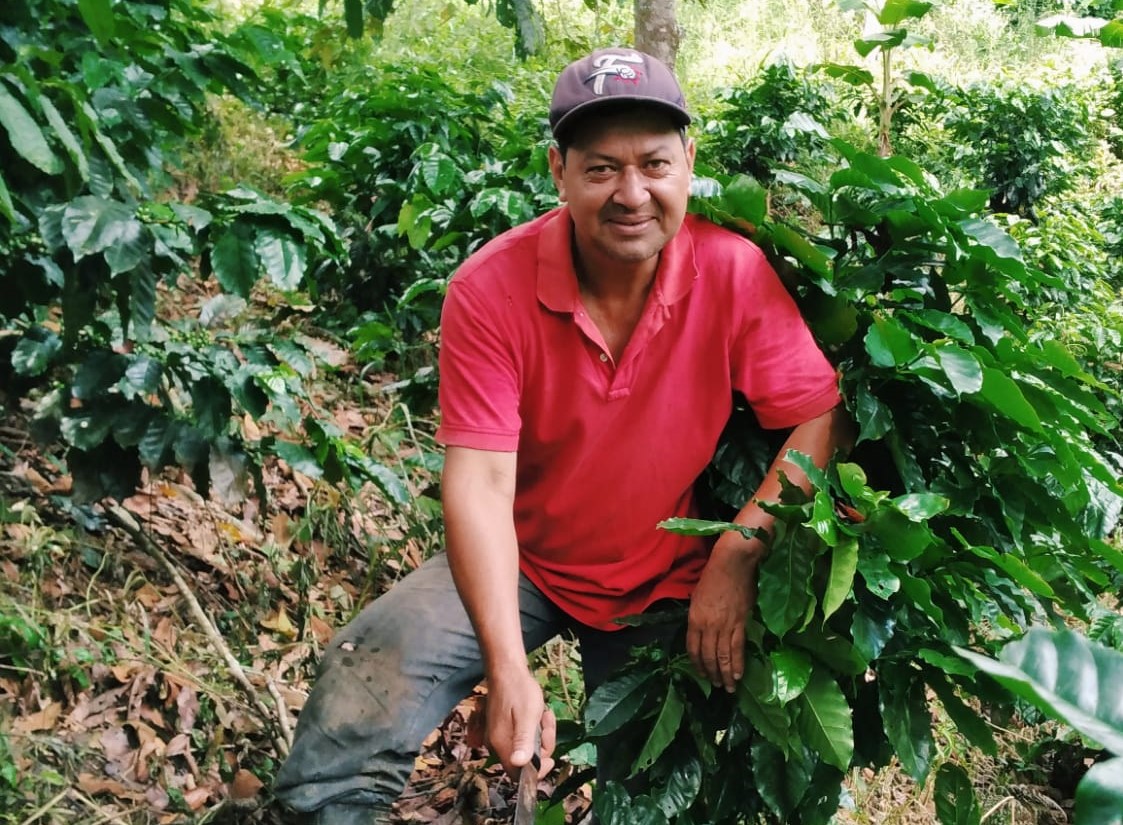The coffee leaf rust pest devastated Vásquez’s plot; however, the adequate use of fertilizers and disease- and pest-resistant coffee varieties has played a crucial role in overcoming the situation and achieving a healthy plot of land.

Managua, 13 October 2020 (IICA) – “I have appreciated the serenity and maturity with which we have been taught”. That is the way in which coffee farmer Denis Omar Vásquez Rivera from the department of Nueva Segovia, Nicaragua, describes the training sessions provided by the Central American Program for Integrated Coffee Rust Management (PROCAGICA), which are geared towards expanding his agricultural knowledge.
A resident of El Escambray, located 17 km north of Jalapa, Vásquez considers his family to be the most important thing. Every detail of his home reflects the effort and work he puts into farming every single day. “You can see how beautiful the plot is. This big garden feeds my family”, he remarks with great pride.
That is why he is so grateful for the assistance he has received from PROCAGICA. “If we produce more, our children’s living conditions will improve—it’s that easy”.
A husband and father of four children, with several decades of experience as a coffee farmer, Vásquez passes down his knowledge of farming to his children. “They have all had the opportunity to work with me in the field; they do it well and enjoy it. My eldest child is now 25 years old and has a degree in Chemistry and Pharmacy. My second child is already studying Systems Engineering. But, as I say to them, farming will always be there, so they’ll never face any shortages”, he stated.
The Héroes y Mártires del Escambray cooperative, of which Vásquez is a member, has existed since 1995 and has been strengthened over the past four years by PROCAGICA. Its members have received training to improve the production and productivity of their plots and have participated in workshops to strengthen their business skills. This has enabled them to become involved in other types of services, such as the management of various coffee production processes.
The coffee leaf rust pest devastated Vásquez’s plot. “I practically lost all of my production that year”, he recalls, describing the anguish he experienced in late 2015 and early 2016. However, the appropriate use of fertilizers and coffee varieties that are resistant to diseases and pests has played a crucial role in overcoming the situation and establishing a healthy plot of land. “The problem has now been solved”, he stated.
These improvements have been life-changing for Denis and his family. They have taken part in a complex learning process that has gradually opened up new opportunities, generating a positive impact on the family’s economy.
“Before, I didn’t know anything about plant destocking, the importance of shade management, or that there are different times when you can fertilize. I learned that a well-nourished plant makes all the difference”, explained Vásquez regarding the practices he has been learning about and implementing in his 2.1-hectare farm, thanks to PROCAGICA.
“Sometimes, you have to make an effort to learn; we travel long distances to participate in these workshops. Every day we leave early, before six in the morning, if possible, and during the harvest season we often work late at night. But we find the time to participate in the program’s training sessions, in order to improve”, he remarked.
Improving the viability of coffee production in the region, which is the objective of PROCAGICA, requires better access to technical assistance services, credit opportunities and education for young producers, as well as clear efforts to strengthen local production organizations. “I expect to get about 25-30 quintals of pergamino [green coffee with a paper-like membrane that has not been removed] from each block”, noted Vásquez with confidence.
His optimism is a testament to the success of the cooperation for development delivered by the European Union and the Inter-American Institute for Cooperation on Agriculture (IICA) through PROCAGICA, which contributes to generating positive long-term changes in the lives of thousands of coffee-producing families in Central America.
More information:
Institutional Communication Division
comunicacion.institucional@iica.int











